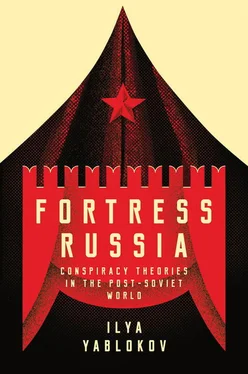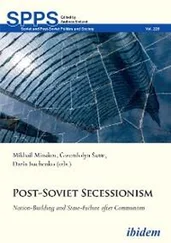The will of the majority was expressed in the All-Union referendum on 17 March 1991, and the state leaders of the USSR and Russia, provided they were patriots, with the fondest love of the Motherland, rather than creeping accomplices ( kholuistvuiuschie prispeshniki ) of the USA, should have realized the people’s will. (Iliukhin, 1999)
The shelling of the parliament building in 1993, which eventually resulted in Yeltsin having more power, also enabled the opposition to argue that his rule was illegitimate. In the words of some of the deputies, the president had been involved in a conspiracy to turn Russia from a parliamentary into a presidential republic. Indeed, as Vladimir Gel’man notes, the 1993 adoption of the new constitution turned Yeltsin into the country’s ‘boss’ (Gel’man, 2015, p. 55). Operating on the basis that he could do anything that the law did not expressly prohibit, Yeltsin placed himself at the very top of the power structure. The opposition tried to challenge him by means of another powerful tool – conspiracy theories.
The last of the charges against Yeltsin was that of the premeditated genocide of the Russian people. This was carried out by means of the liberalization of prices and the privatization of state property, which deprived the majority of Russians of jobs, financial assets and social guarantees. Iliukhin argued that ‘the clan’, consisting of between two hundred and three hundred families, became the main beneficiary of this privatization and usurpation of state power. To erase the memory of the previous social system and of Soviet patriotism, Yeltsin supposedly planned to eliminate pensioners and the intelligentsia – that is, those who could pass on knowledge about the glorious Soviet past to younger generations (Iliukhin, 1999). Despite the attempts of patriots like Iliukhin to prevent any further destruction of Russia, Yeltsin allegedly confirmed, in a letter to President Clinton on 18 September 1998, that there would be ‘no turning back, the reforms will continue’ ( Kommersant , 1999c).
Iliukhin implicitly likened Yeltsin’s genocidal social policies to Nazi policies against the Slavic nations during the Second World War. Since the memory of the Great Patriotic War is so vital in post-Soviet Russia and serves as the foundation for national cohesion, this helped Yeltsin’s opponents to label his policies anti-Russian. In addition, as Bernard Harrison (2006, p. 68) has demonstrated, applying the ‘Nazi’ label in a public speech to a specific group or movement automatically stigmatizes it and implies that nothing can be said in its favour. Likening Yeltsin and his team to the Nazis helped to strengthen the populist dimension of anti-Yeltsin arguments. However, the notion of genocide against the Russian people proved to be more problematic.
An accusation of genocide, used as a political instrument, can have a powerful resonance: it can strengthen the moral and legal pretentions of a group which claims to be the victim of genocide. As Evgeny Finkel (2010) has demonstrated, in the post-Soviet world, the accusation of genocide gained popularity because it supplied the political elites of the newly founded states with a powerful tool for national cohesion. When Russian nationalists accused Yeltsin of conspiring to destroy the Russian nation, they were bringing the notion of genocide into the official political language.
However, an accusation of genocide can backfire. By claiming that elements in the government were responsible for an anti-Russian conspiracy, the parliamentary opposition divided Russian society into ‘the people’ and the Yeltsin-led ‘occupational government’ ( okkupatsionnoe pravitel’stvo ). Filimonov quoted Albert Camus: ‘If you don’t fight injustice – you cooperate with it’. The journalist of the pro-Communist newspaper Zavtra , who covered the debates in the Duma, added: ‘In other words, it will not be possible for other deputies to stand aside. You cannot have it both ways’ (Brezhnev et al., 1999).
The deputies did not grasp the fact that if an accusation of genocide is made, the alleged target of this genocide is required to acknowledge its status as defenceless victim. As Finkel noted, in Russia, ‘the dominant historical myth of military strength, superpower status and victory in the Second World War is difficult to reconcile with the powerless victimhood embedded in the claims of genocide’ (p. 57). Russian nationalist ideology stumbled at this point. It came into conflict with a key element in the profile of a victim of genocide: it required an acknowledgement of weakness. In the context of post-Soviet Russian politics, this was unlikely. It is telling that of all accusations levelled at Yeltsin in the attempted impeachment, it was the genocide of the Russian people that attracted the lowest number of votes (Kommersant, 1999b).
None of the five charges against the president succeeded in gaining the 300 votes required for an impeachment (Kamyshev, 1999). However, since it rested on the claim that Yeltsin had been involved in a conspiracy against the Russian people, it still enabled the accusation of conspiracy to become a legitimate political strategy; it was this notion that united highly diverse opposition forces (from the Communists of KPRF to liberal politicians represented by Yabloko ) and pro-Yeltsin forces ( Kommersant , 1999a).
The liberal forces which opposed Yeltsin used the impeachment procedure as a way of returning to power that they have lost after the August 1998 financial crisis. On 17 August 1998, the Russian government defaulted on its debts to a degree that seriously undermined the positions of deputies from liberal parties in the Duma. So, by supporting the impeachment, they sought to dissociate themselves from their friends and political allies in Yeltsin’s government and gain the support of those voters who were also dissatisfied with Yeltsin. In turn, the Communists and various representatives of the ‘revanchist’ bloc in the Duma attempted to exploit the conflict between Prime Minister Evgenii Primakov and Yeltsin by strengthening their alliance with Primakov, who was at the time widely considered to be a potential future president, and get the support of Russian voters before the parliamentary elections in December 1999 (Zhukov and Samoilova, 1999). The impeachment also coincided with the rise of anti-Western sentiment in Russia which was related to the NATO operation in Serbia in 1999; this too was used by the opposition to win voters’ support.
The impeachment gave rise to concern in the Kremlin about the outcome of the forthcoming presidential elections. The rise of Evgeny Primakov – a former head of the Russian intelligence services, and Russian Prime Minister from 1998–9 – as an independent and powerful politician took place at the same time as the impeachment. The Communists’ support for Primakov and their attempt to impeach Yeltsin by putting forward populist conspiratorial allegations caused major concern among liberal politicians. The image of an aggressive nationalist attempting to challenge executive power by mobilizing the people against the government, and in particular by means of conspiracy allegations, pushed liberal reformers to support the Kremlin’s candidate, who advocated a strong super-presidential model that eventually paved the way for a further shift towards authoritarianism (Shevtsova, 2005, pp. 20–1).
Fenster has pointed out (p. 90) that conspiracy theory as a mode of populist logic is a feature of many political systems, incuding democracies; it can be used to mount a significant challenge to the political order while at the same time highlighting structural inequalities in society. An impeachment of Yeltsin based on conspiracy theories posed a challenge to the post-Soviet Russian political system. The populist conspiratorial rhetoric of the conservatives was bolstered by the social and economic problems that emerged after 1991, which were hugely aggravated by the economic crisis of 1998. Under these circumstances, the government dropped the idea of fostering national consensus and further democratic developments to achieve a compromise with the opposition; instead it focused on creating a consensus among the elites as to who would be a suitable presidential candidate in 2000, so that they could successfully compete with the Communist challenge. As Shevtsova noted (2005, p. 20), those who called themselves liberals in the 1990s were caught in a historical trap, fearful of growing populism and suspicious of the deputies. The political elites were unable to cope with the populist challenge expressed in conspiratorial rhetoric: this was one of the many reasons behind the authoritarian turn in the 2000s. From the moment Putin came to power there have been conspiracy theories about the Soviet collapse, though they have acquired new forms and are now employed by the Kremlin and its leaders.
Читать дальше
Конец ознакомительного отрывка
Купить книгу












